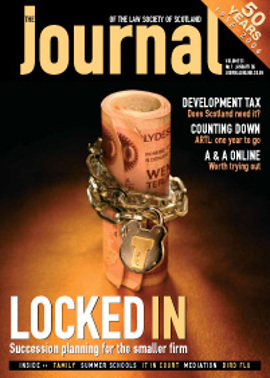The partnership must go on
The legal aid system must be reformed and developed both to facilitate greater efficiency in the justice system and to support wider access to justice. The Board is heavily engaged in a programme of reforms including civil advice and assistance, solemn fees for solicitors, summary criminal legal assistance and more. Further changes are expected to be set out in a bill early in 2006 reflecting ministers’ decisions following the “Advice for All” consultation. However, to make the reforms effective the Board must continue to work in partnership with its stakeholders and we value greatly the substantial engagement we have with the Law Society of Scotland, local faculties and solicitors generally. We do not and will not always agree on all issues but dialogue and joint working are, I believe, necessary to develop revised systems which work for the assisted person, the profession and the Board alike.
Any reforms must be kept under review for there can be unintended results or lower achievement against planned outcomes. For example, experience of the civil reforms introduced in October 2003 has caused the Board to seek further changes to civil fees, and with the agreement of Scottish Ministers we, the Executive and the Society are currently working on the details.
The Board’s aim through the reform programme is to provide access to justice for those who otherwise could not afford it and to achieve best value for the taxpayer. Our focus is not to reduce legal aid expenditure. Legal aid expenditure has risen by 20% over the past four years. Most of this increase has been in criminal legal assistance where there have been significant increases in the volumes of cases and, in several areas, in the cost of cases. In contrast, the cost of civil legal assistance has remained virtually unchanged over the same period but with a reducing number of cases. Indeed the pattern of decline in the numbers of applications for civil legal aid has continued over the past 15 years. Unfortunately the recent reforms of civil legal aid have not stemmed this decline as we had hoped.
We endeavour to pay solicitors fairly and reasonably within the legal aid fees legislation. Where there is not justification for a charge, we do abate account entries. On the other hand we are keen to support solicitors to charge what they are due. Last year we identified that many civil legal aid practitioners were undercharging cases under the reformed block fee system and so we advised them of the charges that could properly be made.
In recent times we have made a number of changes to simplify legal aid, such as the increased use of templates, dealing directly with applicants on financial eligibility issues, and changes to the processes for obtaining sanction for experts. All these have been widely welcomed by the profession, but we recognise the need to simplify further the administration of legal aid and we will look to do so.
The Board’s substantial investment in new technology and systems will allow faster, more accurate processing of legal aid cases, bringing benefits to applicants, solicitors and the Board. Around 200 solicitors are registered to use the new online advice and assistance system; the online civil legal aid system will be rolled out in early 2006 followed by our online criminal system.
This year will also bring the next phase of reforms geared to further improving Scotland’s legal aid system to ensure access to justice, encourage high quality legal aid supply and provide value to the taxpayer. It will be a tough challenge – but also a great opportunity to make a real difference to the system to the benefit of all: the clients, the legal aid suppliers and the Board. I hope the Board and the Society will continue to work in partnership to deliver effective reform.
In this issue
- Pressing ahead
- Regulation, 2006 style
- Held to ransom?
- A world turned upside down
- Quiet revolutions
- For supplement read tax
- Why mediation is a bad idea, and other myths
- Advice in a Europe of many notions
- At the touch of a button
- What sort of courts do we want? (And when?)
- KM in practice
- If the bug bites
- Refreshing risk quiz
- The partnership must go on
- First duty to the court
- A difficult birth
- Nuclear power no thanks?
- Due diligence
- Will less mean better?
- Scottish Solicitors' Discipline Tribunal
- Website reviews
- Book reviews
- Back to the future
- Users' IT requirements for ARTL






